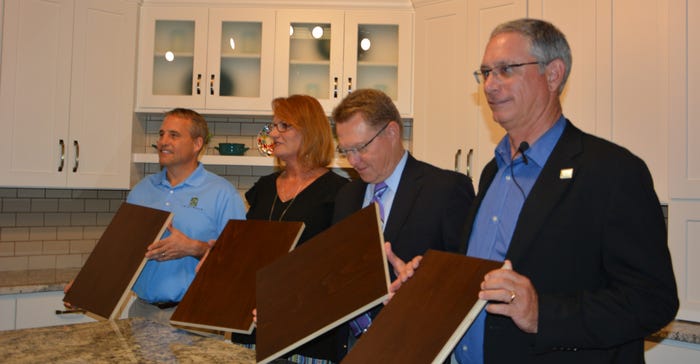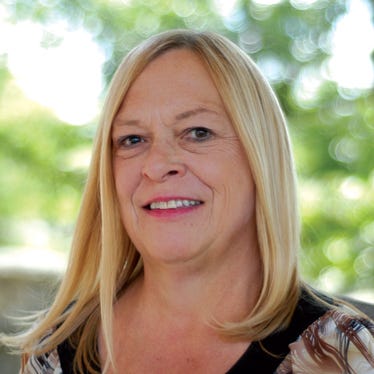
Columbia Forest Products, the nation’s largest decorative hardwood plywood producer, celebrated a milestone June 27 at the home of one of the company’s longtime customers, Crestwood Inc. in Salina, joined by representatives of the Kansas Soybean Association.
“We are celebrating the manufacture of 100 million PureBond panels using soy resin,” said Columbia spokeswoman Jan Barnes. “Those 100 million panels were made with 266 million pounds of soy flour using 6,820,513 bushels of soybeans.”
Columbia began looking for an alternative bonding agent in 2004 following concerns about “off-gassing” of urea formaldehyde from the resins used in making kitchen and bathroom cabinets and furniture created a health risk for millions of Americans, Barnes said.
“We began looking to find a replacement for urea formaldehyde resins, and an Oregon State University researcher, Kaichang Li, uncovered part or the answer in a study of what allowed mussels to cling to rocks being pounded by waves on Pacific Ocean beaches,” she said. “He found they were able to secrete proteins that basically glued them to the rocks.”
Further research discovered that protein-rich soy flour contained the essential ingredient to create a glue that could be used to make hardwood plywood without any added formaldehyde, unlike standard veneer-core and composite hardwood plywood panels. The soy flour product not only provided the adhesion but was more water resistant as well.
Crestwood President Mike Junk said that the relationship with Columbia goes back 50 years, and they were delighted when Columbia began offering formaldehyde-free panels that also helped Kansas soybean farmers achieve a new market for their product.
“U.S. soybean growers appreciate the demand for soy that Columbia Forest Products and its customers have created for our crop that is grown by approximately 515,000 farmers across the nation,” said Lance Rezac, director of the United Soybean Board who grows his own soybeans at Onaga. “We are also proud that U.S soy’s sustainability has contributed to the wellbeing of manufacturing workers, families in their homes, employees at offices and even movie sets where this product is used to avoid exposure to formaldehyde.”
The U.S. EPA honored the researchers who developed PureBond with the 2007 Presidential Green Chemistry Award. According to EPA, the technology represented the “first cost-competitive, environmentally friendly adhesive that replaced the toxic urea-formaldehyde resin.”
Kenlon Johannes, administrator of the Kansas Soybean Association, said the soy checkoff in Kansas raises about $8 million annually. Half goes to the United Soybean Board and $4 million remains in the state, where local commissioners decide how it should be spent.
“Some of that money goes into research that enables the development of products like the soy-based adhesive used in this product,” he said.
Mike Beam, Kansas’ secretary of agriculture, was also on hand to celebrate 100 million PureBond panels and Kansas soy. He says Kansas is in the top ten soybean producing states and last year grew 200 million bushels of soybeans that contributed $1.6 billion to the Kansas economy.
Rezac offered assurances that there is no concern that the added demand for soybeans generated by construction products will mean a shortage of beans for animal and human food.
“Right now, there are about a billion bushels of soybeans in storage, and our farmers have the ability to grow with demand,” he said. “If the demand it is there, farmers will meet it.”
Barnes said that Columbia is looking for additional ways to use soy and other agricultural products to create other related building materials.
“The good news is, with the advances that have been made in manufacturing PureBond panels, we can build them for about the same price as conventional panels,” she said. “That keeps the cost of panels – and the price of cabinets — manageable.”
So far, the 100 million PureBond panels sold have been made into 6.25 million sets of cabinets that are not leaking formaldehyde.
“Laid end to end, that would be 151,000 miles of plywood,” she said.
Of those 100 million panels, Crestwood has used about 165,000 panels. Columbia Forest Products sells all across the U.S., with the largest volume in big population areas such as New York, Washington, D.C., California and Florida.
“We truly love to serve our customers with really good, honest materials,” Barnes said. “And it’s especially rewarding when people like Crestwood take our story and run with it. It makes for a great partnership.”
About the Author(s)
You May Also Like






